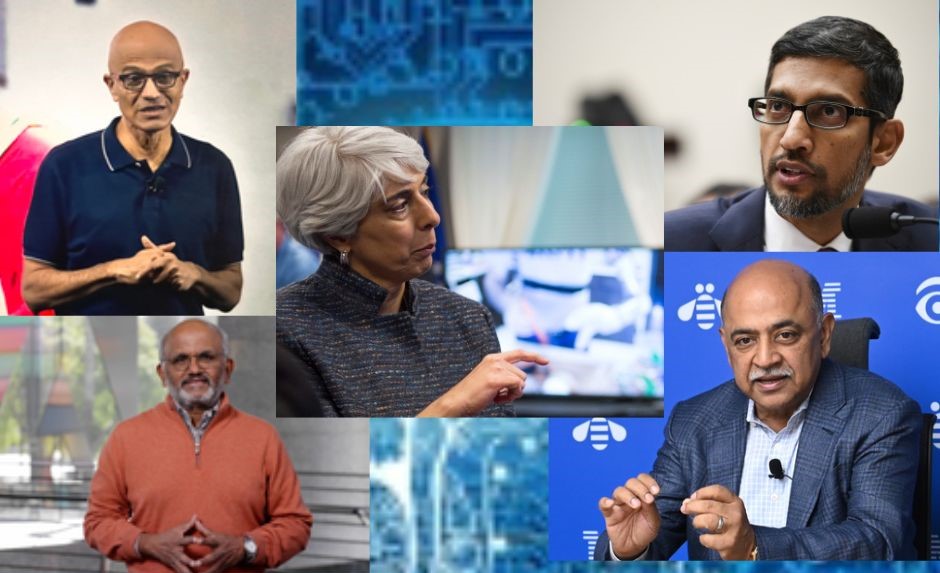NRI PULSE STAFF REPORT
Washington, D.C. April 30, 2024: Five Indian Americans are on AI Safety and Security Board established by the Department of Homeland Security (DHS).
Led by Secretary Alejandro N. Mayorkas, the newly formed Board comprises 22 representatives from diverse sectors, including software and hardware companies, critical infrastructure operators, public officials, academia, and civil rights advocacy. Among them are Satya Nadella, Sundar Pichai, Shantanu Narayen, Arvind Krishna and Arati Prabhakar.
Key Indian American Figures on the Board:
- Satya Nadella (Microsoft): Renowned for his leadership as Chairman and CEO of Microsoft, Nadella advocates for responsible AI deployment and fosters collaboration with policymakers and industry stakeholders to ensure the secure and ethical use of AI technology.
- Sundar Pichai (Alphabet): As CEO of Alphabet, Pichai is deeply committed to fostering the safe, secure, and responsible development of AI. He emphasizes the transformative potential of AI and underscores the importance of establishing guidelines to enhance and secure critical infrastructure.
- Shantanu Narayen (Adobe): Narayen, serving as Chair and CEO of Adobe, brings his visionary leadership to the Board, emphasizing the critical role of AI in enhancing and securing the nation’s vital infrastructure. He advocates for the establishment of comprehensive guidelines to govern AI deployment.
- Arvind Krishna (IBM): Krishna, in his capacity as Chairman and CEO of IBM, leverages his extensive experience in AI to contribute to the Board’s mission. He emphasizes the role of AI in analyzing threat information to protect critical infrastructure from cyberattacks, supporting DHS’s overarching goals.
- Arati Prabhakar: Notably, Arati Prabhakar, serving as Assistant to the President for Science and Technology and Director of the White House Office of Science and Technology Policy, brings a wealth of experience and insights to the Board. With a distinguished career spanning academia, industry, and government, Prabhakar offers a unique perspective on the intersection of AI, national security, and civil rights.
Critical infrastructure encompasses sixteen sectors of American industry, including defense, energy, agriculture, transportation, and internet technology sectors, according to a DHS release. The Board will advise DHS on ensuring the safe and responsible deployment of AI technology in these sectors in the years to come, and it will look to address threats posed by this technology to these vital services.
“Artificial Intelligence is a transformative technology that can advance our national interests in unprecedented ways. At the same time, it presents real risks— risks that we can mitigate by adopting best practices and taking other studied, concrete actions,” said Secretary Mayorkas. “I am grateful that such accomplished leaders are dedicating their time and expertise to the Board to help ensure our nation’s critical infrastructure—the vital services upon which Americans rely every day—effectively guards against the risks and realizes the enormous potential of this transformative technology.”
The experts were selected to develop multifaceted, cross-sector approaches to pressing issues surrounding the benefits and risks of this emerging technology. It will convene for the first time in Early May with subsequent meetings planned quarterly. At the outset, the Board will: 1) provide the Secretary and the critical infrastructure community with actionable recommendations to ensure the safe adoption of AI technology in the essential services Americans depend upon every day, and 2) create a forum for DHS, the critical infrastructure community, and AI leaders to share information on the security risks presented by AI.
The Board will help DHS stay ahead of evolving threats posed by hostile nation-state actors and reinforce our national security by helping to deter and prevent those threats. The DHS Homeland Threat Assessment of 2024 warns the public of the threat AI-assisted tools pose to our economic security and critical infrastructure, including how these technologies “have the potential to enable larger scale, faster, efficient, and more evasive cyber attacks—against targets, including pipelines, railways, and other US critical infrastructure.” It also concludes that nation states, including the People’s Republic of China, are developing “other AI technologies that could undermine U.S. cyber defenses, including generative AI programs that support malicious activity such as malware attacks.”
Here is the complete list of inaugural members of the board:
- Sam Altman, CEO, OpenAI;
- Dario Amodei, CEO and Co-Founder, Anthropic;
- Ed Bastian, CEO, Delta Air Lines;
- Rumman Chowdhury, Ph.D., CEO, Humane Intelligence;
- Alexandra Reeve Givens, President and CEO, Center for Democracy and Technology
- Bruce Harrell, Mayor of Seattle, Washington; Chair, Technology and Innovation Committee, United States Conference of Mayors;
- Damon Hewitt, President and Executive Director, Lawyers’ Committee for Civil Rights Under Law;
- Vicki Hollub, President and CEO, Occidental Petroleum;
- Jensen Huang, President and CEO, NVIDIA;
- Arvind Krishna, Chairman and CEO, IBM;
- Fei-Fei Li, Ph.D., Co-Director, Stanford Human-centered Artificial Intelligence Institute;
- Wes Moore, Governor of Maryland;
- Satya Nadella, Chairman and CEO, Microsoft;
- Shantanu Narayen, Chair and CEO, Adobe;
- Sundar Pichai, CEO, Alphabet;
- Arati Prabhakar, Ph.D., Assistant to the President for Science and Technology; Director, the White House Office of Science and Technology Policy;
- Chuck Robbins, Chair and CEO, Cisco; Chair, Business Roundtable;
- Adam Selipsky, CEO, Amazon Web Services;
- Dr. Lisa Su, Chair and CEO, Advanced Micro Devices (AMD);
- Nicol Turner Lee, Ph.D., Senior Fellow and Director of the Center for Technology Innovation, Brookings Institution;
- Kathy Warden, Chair, CEO and President, Northrop Grumman; and
- Maya Wiley, President and CEO, The Leadership Conference on Civil and Human Rights.





